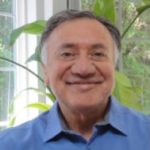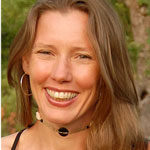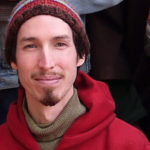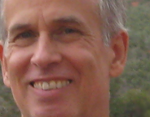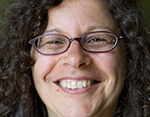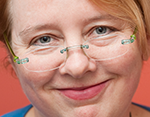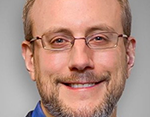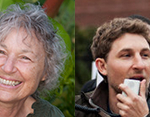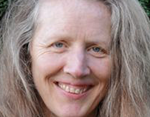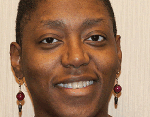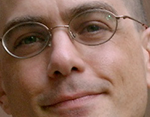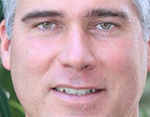
Changemakers, Cultural Creatives, Social Entrepreneurs, Evolutionaries, Positive Change Agents, and Sustainability Activists
This is your opportunity to discover leading-edge social change work that is truly creating a difference.
Join Alan Seid in conversation with some of the world’s best-known Nonviolent Communication trainers.
Robert Gozales
The Role of Self Compassion in Social Change
When I think about “NVC and Social Change,” I desire clarity about what is meant by the term and what the one who is using it means. A clear definition and construct is important to me if anyone is to move with any intention for social change. So I hope to explore the question, What is Social Change? I also see it as important to examine and inquire into our motivations for engaging in what we call social change.
In this interview I see myself sharing one perspective or dimension of social transformation in terms of Wilber’s four quadrant model, especially NVC as applied to each quadrant; briefly, quadrants representing structures or forms as vehicles for divine or life energy. I am also looking forward to talking about the complexity of social transformation and the limitations of the analogy of “picking babies out of the river” vs. “going upstream and preventing them from being thrown into the river in the first place.”
Robert Gonzales stands on the shoulders of Marshall Rosenberg (founder of Nonviolent Communication), Stephen Schwartz (teacher of Compassionate Self-Care), and others as a visionary leader in the field of compassion.
Robert’s evolutionary approach to Nonviolent Communication — with an emphasis on self-compassion — has helped thousands worldwide to find joy and freedom from suffering previously unavailable to them.
He received a Ph.D. in Clinical Psychology in 1989, and was a practicing therapist for many years, offering individual and couples counseling. He met Marshall Rosenberg and Nonviolent Communication in 1985, and has been offering NVC in some form since 1986.
After serving multiple roles with the Center for Nonviolent Communication including Certified Trainer, Certification Assessor, Board President and trainer for International Intensive Trainings (IITs), in 2010 Robert founded the Center for Living Compassion, a nonprofit organization through which he shares his work.
Mair Alight
Being NVC
In attending to our own human needs, we already participate in social change. We change ourselves which affects those around us. As we focus on what might serve the life within us and others, we become increasingly aware of what we experience as not working and explore ways that might work better. Social change in action!
Fundamental concept in “Being NVC” is that of choice, how we each choose to live in alignment with our values/needs…and discovering what that looks like for each of us. Howard Thurman said “Don’t ask what the world needs. Ask what makes you come alive, and go do it. Because what the world needs is people who have come alive.”
I have been facilitating a call structure that offers the experience of “Being NVC”: of ‘coming alive’… On this call I intend to invite us all to experience that “coming alive.” As we commune together silently we might shift to possibility, discovery, creativity, imagination. There is something profound, deep and inspiring when we do this in the presence of others. Mahatma Gandhi said “In the attitude of silence the soul finds the path in a clearer light and what is elusive and deceptive resolves itself into crystal clearness.”
Mair is a CNVC Certified Trainer from Oakland, California, USA. Mair offers games, stories, songs and images to inspire and share NVC using the diversity of her life experiences to offer relevance and to invite understanding. Mair is a founding active member of the Safer Communities Project, offering NVC classes in prison, jails and for parolees and their families.. Mair has co-authored a children’s NVC coloring book, Compassionate Underwear (Bear), co-produced a 60 minute DVD “Living NVC.”
Kelly Bryson
It Takes a Village to Raise a Consciousness
As Nonviolent Communication Trainer Robert Gonzales recently said in a Trainers Teleconference, “Community” is the future direction of NVC. And I have come to believe we need community building tools specifically designed for the job. This is where The Zegg Forum comes in. Developed in the Ecovillages of Europe, it is the foundation of over 13 highly successful, and powerful communities there and is used worldwide in all sorts of organizations, networks and communities. After over 26 years of teaching NVC, I have come to believe this kind of training is what is needed to help people grow and sustain their NVC practice and communities. So join us and learn how to use this powerful, transparency and transformation tool, and other “Tribal Technologies” to start and grow your own NVC community.
We will also learn why it takes a touching, trusting, transparent tribe to socially and spiritually grow people’s consciousness, end the war between the sexes, reconnect with nature, and become a powerfull “field” of evolutionary work in the world.
Kelly Bryson, MA, MFT is the author of the best selling book, “Don’t Be Nice, Be Real – Balancing Passion for Self with Compassion for Others”. He is a licensed therapist in private practice, lecturer, workshop facilitator, and consultant. He has been an authorized trainer for the International Center for Nonviolent Communication for over 20 years, and has trained thousands in the US, Europe, and the Middle East. Kelly is also a humorist, guitarist, singer, and songwriter.
Jim Manske
The Engine of Social Change
My decades-long exploration of social change has yielded some unexpected and surprising results. In our conversation I plan to talk about my research in fields as varied as consciousness studies and economics, to reveal to you and also explore what I see as the most viable avenues for creating meaningful and lasting social change.
Jim Manske became one of the first CNVC certified trainers under the new system of assessment in 2003. He’s also certified in Neuro-Linguistic Programing (NLP), mediation, and public facilitation.
Currently Jim and Jori, his partner for 34 years live in Haiku, Maui, HI. They were co-founders of the non-profit Network for NVC and co-founders and leaders of the CNVC Global Community Circle (GCC), and their business, peaceworks. While Jori was interim Executive Director at CNVC, Jim organized IITs and Special Sessions for CNVC in Albuquerque.
Together they have supported various emerging NVC communities worldwide, and are featured trainers with NVC Academy, Compassionate Leadership, and the Leadership Program for the Korean Center for Nonviolent Communication in Seoul. They feel especially proud about their social change project at a major hospital in the Southwest that has adopted NVC as the “language of compassion” throughout the facility.
Catherin Cadden
Peaceable Revolution Through Education
Start a Peaceable Revolution by starting a school, creating a culture of empathy in a current school, or cultivating a compassionate classroom. Learn what it takes to change the world – willingness to make empathic connection the basis of our actions. Education has the potential to restructure our society for the betterment of human culture and the planet we inhabit.
Catherine Cadden’s work is to advance a consciousness of interdependence among all peoples, for generations to come, through cultivating the physical, intellectual, emotional, and spiritual maturity of the Seventh Generation, and those who directly affect the Seventh Generation.
Since 1987, she worked in U.S. public schools, Montessori, and Waldorf classrooms, witnessing firsthand the devastating effects of the educational system, both mainstream and ‘alternative’: racism, materialism, apathy, alienation, and violence. Having studied the power of social change through the philosophies and movements of Mahatma Gandhi and Dr. Martin Luther King, Jr., in 1997, she opened the doors of TEMBA, a K–8 academic school founded on empathy, self-responsibility, and the tenets of nonviolence. In its eleven years of operation as a true multi-age, multi-ethnic, and multi-class classroom, TEMBA became a beacon of hope for the communities that it served, a place where parents, students, and teachers thrived. TEMBA graduates went on to become leaders in their high schools and colleges, initiating outdoor education programs, creating coalitions between youth and police, and resolving peer conflicts – all while making the highest marks in their academic endeavors.
Catherine has brought trainings in Nonviolent Communication, TEMBA teaching methods, social change organizing, and alternatives to violence to peoples of all ages in Afghanistan, Argentina, Australia, Canada, China, Japan, India, Quebec, South Africa, the United Kingdom, and the United States. Catherine continues the work she started with TEMBA through Play in the Wild!, an organization she co-founded that offers international programs to youth and families.
Jesse Wiens
The Practice of Daily Life
The evolution of NVC from the workshop-era to the practice era. How we are growing a global community of spiritually and emotionally enlightened individuals, without relying on mechanical techniques, gods, or gurus.
Jesse Wiens is a Center for Nonviolent Communication Certified Trainer and the founder of ZENVC, an approach to the practice of Nonviolent Communication (NVC) that integrates mindfulness, nondual awareness, and the wisdom of Zen Buddhism. He has a passion for bringing the best of Eastern and Western wisdom to bear on the problems of today, supporting individuals, couples, and communities to come back into wholeness. In this, he draws from seven years of living and practicing in Zen monasteries, as well as training with NVC founder Marshall Rosenberg, Center for Understanding in Conflict co-founder Gary Friedman, and BayNVC’s Restorative Justice program at San Quentin State Prison. From 2006 to 2007, Jesse sat on the Ethics and Reconciliation Council of San Francisco Zen Center, where he co-wrote the guide for resolving conflicts internally within the community. More recently, he has been the creative force behind worldempathy.org, a global resource for tools and information about empathy, and home base for the International Day for Empathic Action.
Ben Wentworth
Moving from Fear, Aversion and Lack to Love, Aliveness, and Inspiration
It is easy for social change efforts to spring from and perpetuate the same energy that gives rise to much of the world’s suffering. Imagine building social change movements around an energy that is so compelling that people can’t resist contributing and barriers melt away. Let’s take some steps in that direction!
∗
Bob Wentworth is a Certified Trainer and member of the Board of Directors of the Center for Nonviolent Communication. He co-founded Family HEART Camp, an immersive community experience for parents and children. Trained as a physicist, he enjoys thinking about things from a systems perspective, and integrating understanding with heart-centered living.
Dominic Barter
Chalk dust for ninjas: making systems visible
Nonviolence provides a guide to dynamic engagement with the interdependent web of life. The balance of awareness and action, manifesting in our intra-personal, inter-personal and social lives, as one movement, is one of its most intriguing gifts. Our social existence includes the systems we inherit and sustain – our ways of supporting learning, health, justice, resource distribution… They both express and influence our ways of seeing ourselves and the world. When these systems diverge from the needs they were developed to meet, how do we act in ways at once flexible, strong and fiercely compassionate to realign them with our vision of a world grounded in love of life?
∗
Dominic Barter plays with dialogue and partnership, focusing primarily in the fields of education, justice, culture and social change. In the mid-90s he collaborated in the development of Restorative Circles, a community-based and -owned practice for dynamic engagement with conflict that grew from his work in gang-controlled shantytown favelas in Rio de Janeiro. He adapted the practice for the Brazilian Ministry of Justice’s national projects in Restorative Justice and supports its application in a further 22 countries.
Currently he supervises the mediation program for the Police Pacification Units in Rio, is invited professor at the Standing Group for Consensual Methods of Conflict Resolution, at the High Court of Rio, with a focus on school mediation and bullying, and wonders how best to be dad to a 13 year old. Dominic serves on the Board of Directors of the Center for Nonviolent Communication.
Wes Taylor
My Lessons Trying to Transform a 4000 Person Organization
In this interview, Wes will reveal his journey working with an organization attempting to operate by principles of truth-telling, accountability and compassion. Alan & Wes will explore the challenges inherent in organizations that employ hierarchy while holding an egalitarian ethic.
∗
Wes has been working full time in the discipline of Nonviolent Communication (NVC) since 1998. Currently he is responsible for creating alignment in the workforce and culture of Mercy Medical Center in Baltimore, Maryland. Patient satisfaction scores and staff retention statistics have noticeably increased during his tenure with Mercy.
Wes was a founding partner with the NVC Training Institute, a partnership of senior trainers who provided advanced NVC training in N. America and Europe from 2000 until 2012. His background includes a wide variety of training and management consulting services including serving as the founding Executive Director of the Flagstaff Center for Compassionate Communication. His passion for needs-based leadership and organizational functioning began during his initial 15 year career in psychotherapy where systems theory and developmental process were fundamental to his work.
Miki Kashtan
Working for Change Without Recreating the Past
If we want to transform our institutions into organizations based in integrity, meaning and care for everyone, how we work for change is equally important to what change we want to create. The “how” – maintaining a commitment to nonviolence on the deepest level – will require working for change, even in the face of oppressive structures, without any hatred, as well as creating a world that works even for the former oppressors.
∗
Miki Kashtan is a co-founder of Bay Area Nonviolent Communication (BayNVC) and has taught NVC on five continents. She is inspired by the role of visionary leadership in shaping a livable future, and works toward that vision by sharing the principles and practices of Nonviolent Communication through mediation, meeting facilitation, consulting, retreats, and training for organizations and committed individuals. Miki blogs at The Fearless Heart and her articles have appeared in Tikkun magazine, Waging Nonviolence, Shareable, and elsewhere. She holds a Ph.D. in Sociology from UC Berkeley.
Kit Miller
Working From the Heart: Integrating NVC
Over the last 15 years in a variety of settings, including cnvc and baynvc, Kit has been trying to understand and implement ways of integrating the principles of nvc into everyday organizational life. How to balance connection, inclusivity and choice with effectiveness, ease and clarity?
∗
Kit Miller serves as the director of the M.K. Gandhi Institute for Nonviolence. Her prior position was as director/celebrator of Bay Area Nonviolent Communication in Oakland, California. In part after coming to understand through meditation about violence within the human heart and mind, Kit began learning about and organizing for nonviolence for the last 20 years in many capacities. She works on community projects related to restorative justice, sustainability and race as applications of nonviolence in Rochester. Kit co-leads retreats each year in California and at the Findhorn Foundation in Scotland, working with activists from around the world. She has 3 children and is amazed and grateful to have been happily married for 21 years.
Jeff Brown
Claiming your Power and Leadership using Nonviolent Communication Principles
Every person has the power to influence and impact those around them. The most important question is this: “How will we use our power and exercise personal leadership in the service of humanity?”
Nonviolent Communication offers us a way of using our
power beyond the traditional “power over” (domination tactics) or “power under” (giving up and giving in) — it’s called “power with.”
Strangely, however, people who practice NVC often abdicate leadership because they can only associate it with “power over” and domination tactics.
This interview will illuminate how we can all claim our personal power and increase our ability to create a compassionate world in which everyone’s needs matter.
∗
Jeff Brown is the Executive Director of Compassionate Communication of Central Ohio, a nonprofit training and consulting organization based in Columbus, OH (since 2009).
He is a Certified Trainer (since 2005) with the Center for Nonviolent Communication.
Jeff holds a master’s degree in Psychology from the University of Santa Monica (Los Angeles, CA) and is trained in restorative justice practices including Victim-Offender Reconciliation, Community Mediation and Restorative Circles.
From 2009-2012, he was a trainer with the NVC Training Institute, a collaboration of six trainers who offered in-depth residential retreats worldwide in Compassionate-Nonviolent Communication.
Karl Steyaert
Consciousness in Action:
7 Practical Steps for Change Agents
In this enlivening talk, cultural catalyst and visionary Karl Steyaert explores principled and practical ways people can be more effective AND joyful as nonviolent change agents. Informed by years as an ecovillage community designer & builder, restorative justice facilitator, Certified NVC trainer, and grassroots & university educator, Karl synthesizes his experience into inspiring and useable suggestions for nonviolent personal and planetary transformation.
∗
Karl is a cultural catalyst, passionate about co-creating learning experiences and communities that contribute to peace, justice, and sustainability. With over 20 years of experience teaching and facilitating groups, he has helped catalyze learning in settings ranging from university classrooms (University of Michigan, University of Massachusetts, University of Washington) to ecovillages (Findhorn Community, Scotland; Auroville, India) and urban gardens.
As a Certified Trainer in Nonviolent Communication (NVC) he has led trainings in conflict resolution and communication across North America, Europe, and Asia. In addition, he facilitates Restorative Circles, an approach to restorative justice grounded in NVC.
With academic training in Anthropology and Environmental Policy, Karl enjoys practicing & sharing ecovillage design, Permaculture, aikido (a nonviolent Japanese martial art), Buddhist meditation, and yoga. Karl lives in Seattle, Washington, in an intentional community house he co-founded with a group of dear friends. He also loves to ride his bike, climb mountains, and play.
Karl’s website is findflow.org.
Jori & Jiva Manske
Organizing for Effective Social Change
Both Jori and Jiva have participated in organizations that have facilitated major changes in the area of Human Rights, including survival and justice. Join us as we share our experiences of what has worked to shift governmental, corporate and personal choices toward supporting a cause. How can we influence major social change?
∗
Jori has been actively involved with several social change organizations that have contributed to the well-being of people around the world, including the grassroots organization that has been called the most powerful lobby in Washington. She has served CNVC as executive director, board member, and with her husband, Jim, as co-founders and leaders of the CNVC Global Community Circle (GCC). Other contributions include co-founding board member of the Network for NVC, founding board member and trainer with Comienzos.org jail program, and co-developer of NVC Alive in a regional hospital which then changed their mission statement to include NVC. Her trainings and service have taken her to many states in the USA, as well as to Europe, Central America, Asia, and Australia. Currently she is the lead Mediation Trainer with Compassion Leadership, and serving through mediation, group facilitation, mentoring, and organizational development. And her greatest honor is to be family with her husband, Jim; son, Jiva; and daughter, Jaya.
Jiva introduced the concept of restorative justice to Brown University through his Honor’s Thesis. He has his masters in Peace Studies from the European Peace University in Austria and currently works in Washington, DC, with Amnesty International. He has created educational programs and trained in NVC and Peace Studies with Comienzos.org and Georgetown University. He as also trained in Costa Rica, Afganistan, and Iran. He began his path of social change in Washington at the age of 10 on his first trip to Washington, DC when he spoke with Sen. Dominici in his office, as part of a delegation advocating for funding micro-enterprise loans for poor people around the world.
Gayano Shaw
How Does Social Change Live in You?
Spend time focusing and connecting to the heart of what motivates us to act in the world. Social change is not a ‘something’ out there that is ‘done’, but the manifestation of what lies in the heart of the individual.
∗
Gayano has been living in South West Wales for the past 13 years with her three children aged 27, 17 & 9 years old. She has spent the last 6 years deeply inspired by and immersed in the consciousness and living of NVC. She is passionate about creating, offering and holding nourishing spaces and events for individuals and communities of all ages that can enable and support the experiencing of compassionate connections. Lived experiences include family and community living, home/un schooling/self directed learning, marriage, divorce, single parenting, ‘step’ families, special time & creative listening, counseling, running centers and cafe projects for people with special needs, care work, natural nutrition, living with debt, self employment and studying in her late 40’s for a degree in Anthropology.
Roxy Manning
Is NVC for everyone? or Why aren’t there more people like me at this event?
Every year, I hear both questions. Some within the NVC community are sad and discouraged that there are not more people from a wider variety of ethnic backgrounds at NVC events. As an African-American woman, I’m aware that at most NVC events, I’m usually the only, or one of the only, visible ethnic minorities present. And, some folks from non-European ethnic backgrounds express hopelessness at finding either companionship at NVC events, or trust that they are truly welcome. What makes it so challenging for people of color at NVC events? What can we do to increase the likelihood that all people attending these events will experience the sense of inclusion and acceptance we want them to have?
∗
Roxy Manning, a licensed clinical psychologist, has been using NVC in her psychotherapy practice since 2003, and has been formally teaching NVC since 2005. She provides coaching to individuals and couples who wish to deepen their integration and utilization of NVC in their lives. Roxy works with therapists and health professionals to help them bring an NVC consciousness to their therapeutic approach with clients. Roxy has worked with businesses and non-profits to increase their ability to function more cohesively as a team and to better understand and respond to client needs and requests. Roxy has also worked at over 30 intensive retreats with people seeking the deepening and integration of NVC consciousness that is supported by group interaction and sustained contact. She is on staff at BayNVC, where she is the lead trainer for the NVC Leadership Program. She is a co-founder and trainer of the NVC and Diversity retreat since its inception in 2007 and is the main organizer and lead trainer for the New York Intensive, now in its 10th year.
Alan Seid
A Toolbox for Sustainable Living and Cultural Transformation
In this interview I hope to talk some about the extraordinary journey that brought me to this point, and focus on how various tools, processes, & methodologies — including NVC — made all the difference. One reason I see that people don’t achieve their goals is because they don’t have the skills. So having good tools is one thing, but you have to become skillful with them, and that only happens through practice. I work with “positive change agents” and what I’ve noticed is that there are 5 things they need: (1) mindsets, (2) tools, (3) skills, (4) resources, (5) community. I look forward to sharing examples of how I’ve used NVC in social change situations, and about what I’ve created for change agents to learn NVC.
∗
Alan Seid (pronounced “side”) has been studying NVC since 1995. After an IIT in 1999, Alan worked as Marshall Rosenberg’s Spanish interpreter in South America, and has been a CNVC Certified Trainer since 2003.
Since his teenage years, Alan has been passionate about best practices for creating harmony with the planet, between people, and within ourselves. Alan lives on 25 acres in the foothills of the North Cascades in the Pacific Northwest where he also engages in an ecologic design system called Permaculture Design.
Alan works as a coach, consultant, and seminar leader, focusing on working with people who are committed to making a positive difference.
Alan is also founder of the Blackbelt Communication Skills Coaching Program and Cascadia Workshops, an internet publishing company. Within NVC, Alan’s passion lies with how to apply NVC to positive social change.
Gregg Kendrick
Creating Workplaces Where People Thrive
Our modern workplaces recognize the potency of such qualities as empowerment, trust, engagement, authentic feedback… but struggle to realize these qualities in business structures where power is concentrated, where shareholders are valued above other stakeholders, where fear is the chief motivator, where compliance and control are the primary means of “leading” and where judgments, blame and criticism are the language of accountability.
But there is another way. A way where passion for purpose is matched by compassion for people. A way that values all stakeholders. A way that harvests connection out of conflict. A way that motivates intrinsically rather than through the manipulation of rewards and punishments. A way where accountability is about mutual understanding, learning and making new choices. A way that invites people to act autonomously in alignment with the clarity of organizational purpose and values. A way that values the fullness of human potential and of universal human needs.
Come join us in this interview with Gregg Kendrick to get a glimpse of workplaces that are moving toward this new way. Among the possible topics are stories and real-world examples from Gregg’s experiences as both business-owner and consultant to organizations that want to value people as much as purpose; processes and structures that enable these new workplaces like needs-based communication (aka Nonviolent Communication™ or NVC), Dynamic Governance™ (aka Sociocracy™) and Integrated Clarity™; and what is unique about introducing NVC in a workplace environment.
Our workplaces don’t have to be the way they have always been; they can be places where people come alive …
∗
Gregg speaks, hosts workshops and consults on topics related to communication and collaboration on teams. He specializes in helping work teams apply needs-based structures that encourage “power with” rather than “power over” interactions for increased productivity, profit and morale. Managers “manage” less while the team achieves its goals with more personal meaning.
At the core of Gregg’s work is a process of needs-based communication (NVC). His work involves not only applying NVC as a communication process, but also on applying it for personal mastery and to needs at the organizational level. This unique focus on connection to human feelings and needs on three levels – within ourselves, with others and within the systems we work – empowers a dynamic integration of human connection with business purpose, of gentleness and fierceness, that enlivens business to “higher ground.”
Gregg founded Basileia LLC in 2004 to do consulting, training and coaching internationally to “create workplaces where people thrive.” In 2012 Basileia joined the IC Globally Team to collaborate with Marie Miyashiro, consultant and author of The Empathy Factor.
